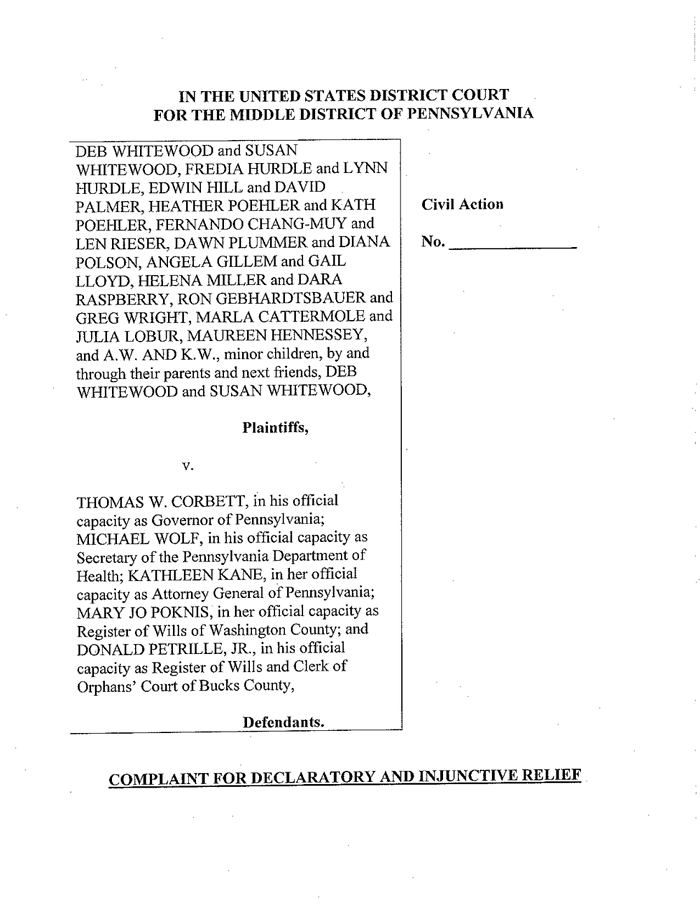
WASHINGTON — The American Civil Liberties Union headed back to court Tuesday morning, filing a lawsuit in federal court in Pennsylvania aimed at winning same-sex couples the right to marry.
"The issue is going back to the Supreme Court, it's just a matter of time," James Esseks, the head of the ACLU's LGBT Rights Project, told BuzzFeed Tuesday. "We want to add the voices of these plaintiffs to that discussion."
The new lawsuit, filed in Harrisburg, comes less than two weeks after the Supreme Court decided that another ACLU client, Edith Windsor, was correct that the Defense of Marriage Act's federal definition of marriage is unconstitutional.
Tuesday's lawsuit — in which the ACLU is joined by lawyers from the Philadelphia law firm of Hangley Aronchick Segal Pudlin & Schiller — reflects the changes on their way in the wake of that decision.
"Because of Pennsylvania's refusal to allow or recognize their marriages, same-sex couples are also denied many federal protections afforded to married couples such as the ability to take time off work to care for a sick spouse under the Family Medical Leave Act and access to a spouse's social security retirement benefits," the lawsuit claims.
"We, like everybody, were waiting to see what the Supreme Court did in [United States v.] Windsor and [the Proposition 8 case, Hollingsworth v.] Perry," Esseks said, noting that the justice's decision to dismiss the Proposition 8 appeal "leaves the question open" as to whether there is a constitutional right for same-sex couples to be able to marry.
"Even before we filed this case ... there were seven cases filed with federal claims" about marriage, Esseks noted, saying, "We also want to get these stories to federal courts that are willing to give theses issues a fair hearing."
The stories of the plaintiffs in the Pennsylvania lawsuit filed Tuesday run the gamut. As the lawsuit describes the plaintiffs, they include "an emergency room doctor, university professors, a truck driver, an executive at BNY Mellon, a psychologist, a dog trainer, state employees, lawyers, an artist, a stay-at-home mom, and retirees."
The lawsuit claims that the Pennsylvania's ban on allowing same-sex couples to marry violates the U.S. Constitution, on both equal protection grounds because lesbian and gay people are treated differently from straight people under the law and due process grounds because marriage is a fundamental right.
An appeal of a decision in the Pennsylvania case — led by plaintiffs Deb and Susan Whitewood and filed against Gov. Tob Corbett and others — would go to the Third Circuit Court of Appeals. The ACLU also plans on amending an existing lawsuit in North Carolina to include marriage claims and is in the early stages of planning a lawsuit with Lambda Legal to be filed in Virginia. Appeals of those cases would be heard in the more conservative Fourth Circuit Court of Appeals. Other pending cases out of Hawaii and Nevada are before the Ninth Circuit, and still other cases are pending in state and federal trial courts.
About Tuesday's lawsuit, Esseks said the claims were "focused on the stories of families, the harms faced by same-sex couples and their kids — which is obviously something the court wrote about, with passion, in Windsor."
In Justice Anthony Kennedy's decision in favor of Windsor, he wrote for the court about DOMA's unequal treatment of same-sex and opposite-sex married couples, "The differentiation ... humiliates tens of thousands of children now being raised by same-sex couples. The law in question makes it even more difficult for the children to understand the integrity and closeness of their own family and its concord with other families in their community and in their daily lives."
Esseks talked Tuesday about both the ACLU's history in advancing LGBT rights, as well as the larger picture — outside of lawsuits — in advancing marriage equality and other LGBT rights.
"The ACLU's been doing LGBT rights work since 1936. There were no gay rights organizations then. The first marriage case [in Minnesota] was brought by us in 1970," he said. "We're working for the freedom to marry, have been for decades, and are going to continue to do that.
Looking to legislative efforts and ballot measures as well, Esseks noted, "This is part of, but not the only way, to get to the end goal of the freedom to marry for all same-sex couples across the country. I very much see these cases in the larger picture — no one should think that this is all we need to do."
On the legislative front, Esseks mentioned efforts in Hawaii, Illinois and New Jersey. At the ballot, he referenced the planned Oregon ballot effort in 2014 and the anticipated 2016 effort in Nevada.
Esseks believes that Tuesday's filing was a step toward getting ready to go back to the Supreme Court — in four to five years, he said.
"I think that the court is going to be ready. I think the country is absolutely ready. We don't know whether they would be ready now, [but] ... if we do the work that we need to do ... then I have no doubt that the court will say the freedom to marry protects everybody."

